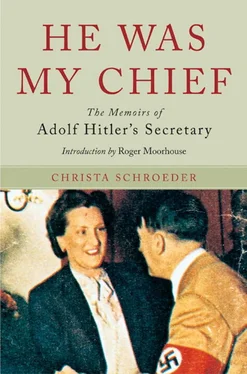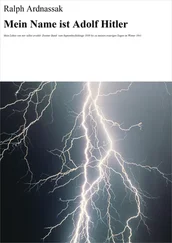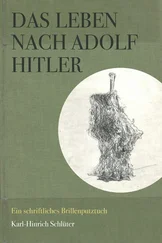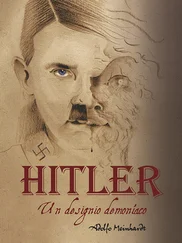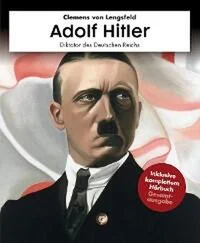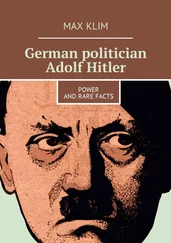Christa Schroeder - He Was My Chief - The Memoirs of Adolf Hitler's Secretary
Здесь есть возможность читать онлайн «Christa Schroeder - He Was My Chief - The Memoirs of Adolf Hitler's Secretary» весь текст электронной книги совершенно бесплатно (целиком полную версию без сокращений). В некоторых случаях можно слушать аудио, скачать через торрент в формате fb2 и присутствует краткое содержание. Город: Barnsley, Год выпуска: 2012, ISBN: 2012, Издательство: Frontline Books, Жанр: История, Биографии и Мемуары, на английском языке. Описание произведения, (предисловие) а так же отзывы посетителей доступны на портале библиотеки ЛибКат.
- Название:He Was My Chief: The Memoirs of Adolf Hitler's Secretary
- Автор:
- Издательство:Frontline Books
- Жанр:
- Год:2012
- Город:Barnsley
- ISBN:978-1-7830-3064-4
- Рейтинг книги:4 / 5. Голосов: 1
-
Избранное:Добавить в избранное
- Отзывы:
-
Ваша оценка:
- 80
- 1
- 2
- 3
- 4
- 5
He Was My Chief: The Memoirs of Adolf Hitler's Secretary: краткое содержание, описание и аннотация
Предлагаем к чтению аннотацию, описание, краткое содержание или предисловие (зависит от того, что написал сам автор книги «He Was My Chief: The Memoirs of Adolf Hitler's Secretary»). Если вы не нашли необходимую информацию о книге — напишите в комментариях, мы постараемся отыскать её.
He Was My Chief: The Memoirs of Adolf Hitler's Secretary — читать онлайн бесплатно полную книгу (весь текст) целиком
Ниже представлен текст книги, разбитый по страницам. Система сохранения места последней прочитанной страницы, позволяет с удобством читать онлайн бесплатно книгу «He Was My Chief: The Memoirs of Adolf Hitler's Secretary», без необходимости каждый раз заново искать на чём Вы остановились. Поставьте закладку, и сможете в любой момент перейти на страницу, на которой закончили чтение.
Интервал:
Закладка:
Frau Schneider [129] Herta Schneider née Ostermeier (b. 4.4.1913 Nuremberg) knew Eva Braun from their primary schooldays. Eva Braun was a frequent visitor at the Ostermeier’s because her parents were not interested in her. In 1936, Herta married, and from then until 1945 spent long periods at Obersalzberg with her children. On 28.4.1945 she left for Garmisch-Partenkirchen with Margarete Fegelein, Eva Braun’s sister.
was her friend of longest standing. Of the other women, one or another of the doctors’ and adjutants’ wives would be in favour with Eva Braun from time to time, and would be invited to Portofino with her, this being a place she adored. All the others would then be wary and maintain a reserve towards the reigning favourite. It was often an odd bunch up there on the Berg.
From 1944, enemy aircraft began to overfly Berchtesgaden. The sirens would howl frequently and the smoke batteries would conceal the region. Hitler was expecting a concentrated attack on Obersalzberg, as he did on his FHQ. In 1943 bunkers were built, ready by Christmas. They saved my life in 1945. Within a few steps of the back door of the house there was an iron door from where sixty-five steps led down to the bunker complex.
Chapter 15
The Order to Leave Berlin: My Leave-taking of Hitler
AFTER THE FÜHRER-BUNKER IN the Reich Chancellery park had been reinforced, Hitler withdrew his FHQ to Berlin in January 1945. The bunker had been intended as a temporary refuge during air attacks, but after the upper rooms of the Radziwill Palace, particularly the library, had been made uninhabitable by incendiaries, Hitler spent most of his time with his staff in the bunker. [130] The Vorbunker (built 1936) and Hitler’s bunker (built 1943) lay below the Reich Chancellery palace in the Wilhelm-Strasse and extended below the Reich Chancellery park. Access was by a stairway from the Reich Chancellery palace and a 105-metre-long corridor known as the ‘Kannenberg Corridor’ because of the provisions stored there, or from a tower-like entrance in the park. An alleged corridor into the Propaganda Ministry suggested in many sketches never existed.
It extended below ground into the Reich Chancellery park, where there was an emergency exit in the form of a small concrete turret. There were several stairways from the main building down into the bunker.
In the Radziwill Palace, the Adjutancy Wing, including the Staircase Room, was undamaged, and so at the beginning of 1945 we secretaries would take our meals during the day with Hitler behind drawn drapes with the lights on while outside the spring sun shone down on the gutted Hotel Kaiserhof and the Propaganda Ministry. The evening meal was served in the Führer-bunker in Hitler’s small, sparsely furnished room. Already narrow, it was equipped with a small writing desk, a small sofa, a table and three chairs. To move across the room required a repositioning of the chairs. The room was cold and unpleasant. On either side was a door, one leading to his bathroom, the other into a cramped bedroom. The study was dominated by a portrait of Frederick the Great [131] This was the portrait by Anton Graff. Hitler’s attitude at the end can be summarized precisely by a letter from King Frederick to Podewils on 27.4.1745, exactly 200 years before: ‘I shall either hold out or, if not, I desire that everything shall be destroyed and the Prussian name be buried with me.’
which hung over the writing desk. With his large, powerful eyes the old ruler glared down at Hitler. The oppressive narrowness of the room and the overall general mood in the bunker had a depressing effect.
At six in the morning, when Hitler received us after the nightly situation conference, he would usually be lying exhausted on the little sofa. His physical decline made daily advances despite his desperate attempts to hold himself together. He always managed to rise to greet us though, sinking back after a while, his manservant raising his feet for him. He was almost permanently emotional, and his talk was increasingly the monotonous repetition of the same stories. At lunch, dinner and the nightly tea sessions (i.e. in the early hours of the morning) the same again. Thus almost every day he would tell us: ‘This beast Blondi woke me again this morning. She came to my bed wagging her tail and when I asked her: ‘Do you have to do your business?’ she dropped her tail and crept back to her corner. She is a sly animal.’ Or: ‘Look, my hand is improving. It is not trembling so much, I can almost hold it out firmly.’
The things he talked about became gradually more flat and uninteresting. He no longer discussed the Church, racial problems, economic and political questions, about being Nordic and German, Ancient Greece or the rise and fall of the Roman Empire. He, who had always been so passionately interested in all matters of science, zoology, botany and human development spoke out in the latter months only on dog-training, nutrition and the stupidity and degeneration of the world.
The morning tea session usually went on for two hours. Afterwards Hitler would rise and drag himself to the dog’s box. Blondi had had puppies in March, and from the litter Hitler had selected a male puppy to raise and train himself. He would remove this animal from the box, sit in his room with the puppy in his lap, stroking it incessantly while muttering its name, Wolf. After a while he would return the puppy to its mother and take his leave of us to rest. This was latterly around 0800. It would not leave him much time for sleep, for the sirens would generally start up at about 1100. On the approach of enemy bombers he would always get up, for he feared that a bomb falling diagonally could penetrate and collapse the bunker wall. Since the bunker was below the water table, there was a danger that in such a case the water would rush in. Accordingly when enemy bombers were arriving he would dress fully and even shave. During an air raid alarm he would never remain alone in his room.
Dinner, usually between 2100 and 2200, was customarily an extended affair. The approach of enemy aircraft would often be announced during this period, when the wire and police network would be switched on. The radio channel broadcast a monotonous bleeping when not passing reports about the bombers. We used to sit listening to the bombs exploding, and there was never a day when the government district was spared. In the heavy air raid of 3 February 1945 fifty-eight HE bombs fell around the Reich Chancellery. Every time a bomb exploded in the vicinity, the bunker, lying in ground water, would tremble perceptibly. If the lights flickered, Hitler would say: ‘That was near. That bomb could have hit us!’
After the All-clear, he would at once request a damage report, and listen to it calmly without interrupting. The nightly situation conference would not begin until long after midnight, and would often last until dawn. Then the tea session would follow, he would play with the dogs and sleep a few hours until the next aerial intrusion, which would take us to lunch. Afterwards he would call the afternoon situation conference, and the whole game would begin again.
On Hitler’s fifty-sixth birthday on 20 April 1945, Berlin was surrounded, and the first Russian tanks reached the outskirts. We could hear the thunder of the field guns from the Reich Chancellery. The chorus of congratulations from the personal staff and the military that morning was very restrained in comparison to earlier years, whereas that of the Allies was much more impressive. The series of rolling air raids lasted from early morning until 0200 next day. We no longer left the bunker. According to the service roster, Johanna Wolf and I had to keep the boss company until lunch. The mood was very gloomy as we ate.
Читать дальшеИнтервал:
Закладка:
Похожие книги на «He Was My Chief: The Memoirs of Adolf Hitler's Secretary»
Представляем Вашему вниманию похожие книги на «He Was My Chief: The Memoirs of Adolf Hitler's Secretary» списком для выбора. Мы отобрали схожую по названию и смыслу литературу в надежде предоставить читателям больше вариантов отыскать новые, интересные, ещё непрочитанные произведения.
Обсуждение, отзывы о книге «He Was My Chief: The Memoirs of Adolf Hitler's Secretary» и просто собственные мнения читателей. Оставьте ваши комментарии, напишите, что Вы думаете о произведении, его смысле или главных героях. Укажите что конкретно понравилось, а что нет, и почему Вы так считаете.
